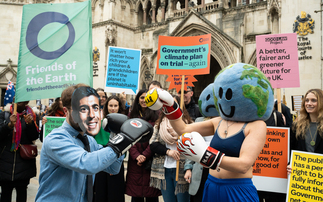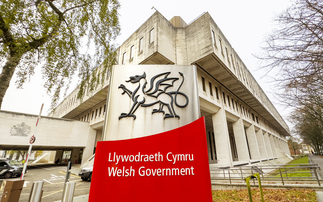New study highlights the critical importance of decreasing deforestation and the role businesses can play
Carbon emissions from tropical deforestation could be halved in the next five years, playing a crucial role in limiting global warming to the 2C benchmark, a new study has found.
The research, which is published today in the journal Global Change Biology, sets out scenarios for how major reductions to current rates of deforestation across the tropics could be made, stopping 1.4 billion tonnes of carbon from being released.
Daniel Zarin, lead author of the paper and director of programs at the US-based Climate and Land Use Alliance, told BusinessGreen that the reductions are "very much doable" but require a major push from countries who have committed to cutting their deforestation rates, support from the international community, and strong business leadership.
"[I]t does certainly require the leadership of the business community, to go beyond the commitments that have been made by some companies to a wider mainstreaming of no-deforestation commitments," he said. "Getting that new way of doing business that really recognises that businesses are responsible for the impacts - positive and negative - of their enterprise, is something that needs to be taken up in a mainstream way across businesses."
One major source of ideas for how to reduce deforestation emissions is coming from Brazil, which has massively reduced its tropical deforestation emissions from 1.8 gigatonnes (GT) in 2003 to 0.4 GT in 2012. While the country still ranks first worldwide for tropical deforestation, its percentage of global deforestation emissions has fallen from a peak of 69 per cent in 2003 to 20 per cent in 2012.
"Brazil's historic success is built on a combination of public policy changes, transparency, improved law enforcement and voluntary actions in the private sector," said Tasso Azevedo, a co-author of the study and a forest and climate change expert based in Brazil, in a statement.
But other countries have struggled to follow Brazil's lead, with increased emissions in other countries largely offsetting Brazil's reductions. Indonesia, the second biggest deforestation emitter, only peaked its emissions in 2012 and there are fears emissions could rise again this year in the wake of devastating forest fires which have occurred in recent months.
However, last year Indonesia and 14 other tropical countries signed the New York Declaration on Forests (NYDF), which included a goal to half natural forest loss by 2020. The new study also noted the possibility of real progress in the Indonesian government's response to this year's fires, through measures such as a moratorium on new peat and primary forest licences and a "major" peatland restoration effort to avoid future fires.
In order to calculate the potential emissions cuts from decreased deforestation, the paper pulled together new satellite-based data of tropical forests to calculate the average yearly emissions from deforestation between 2001 and 2013, then set out two pathways to meeting the goal of halving emissions by 2020, from 2.3 GT today to 1.15 GT in 2020.
In the first scenario, Brazil makes no further reductions in the rate of deforestation, the countries signed up to the NYDF fulfil their pledge and cut deforestation emissions in half, while the remaining 86 tropical forest countries then reduce their collective emissions by 35 per cent. In the second scenario, Brazil reduces its deforestation emissions even further than 2012 levels, NYDF countries halve their deforestation emissions and the remaining 86 tropical forest countries reduce their deforestation emissions by four per cent.
"The first scenario is a lot harder for a lot of the world's poorest countries to achieve," said Azevedo in a statement. "The second scenario is very plausible for Brazil. We need to build on the success of the past decade and really capitalize on the huge potential to intensify agricultural production on lands that have already been cleared rather than cutting down forests. Brazilian scientists know how to do this."
However, while there has been good examples of government action and corporate commitments beginning to take hold, Zarin argues that more still needs to be done to incentivise the conservation of forests through a combination of public and private investment.
"What seems to be missing, and where there is certainly room for additional work, is in the public private partnership space, where new, green investments in sustainable agricultural production can be linked to government policy to constrain expansion into forested areas," he said. "It's a very important area where the private sector role and the financial community may be able to begin to look at very positive investments around a combination of both producing more food and conserving forests."
The paper comes as heads of government from major forest and donor countries will today come together for a meeting at the Paris climate conference to endorse action on forests as a key climate solution. In an event hosted by Mary Robinson, the UN Secretary-General's special envoy on climate change and former president of Ireland, leaders are expected release a joint statement committing to collective action on rural economic development, stopping deforestation and massively increasing forest restoration.
"Things are moving in the right direction; [but] they're moving way too slowly," said Zarin."We have a really tremendous situation of urgency with the climate crisis in general, with deforestation in particular, and we're racing against time here."
This article is part of BusinessGreen's Road to Paris hub, hosted in association with PwC.








